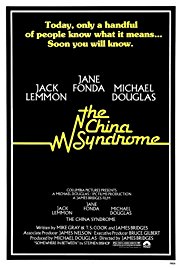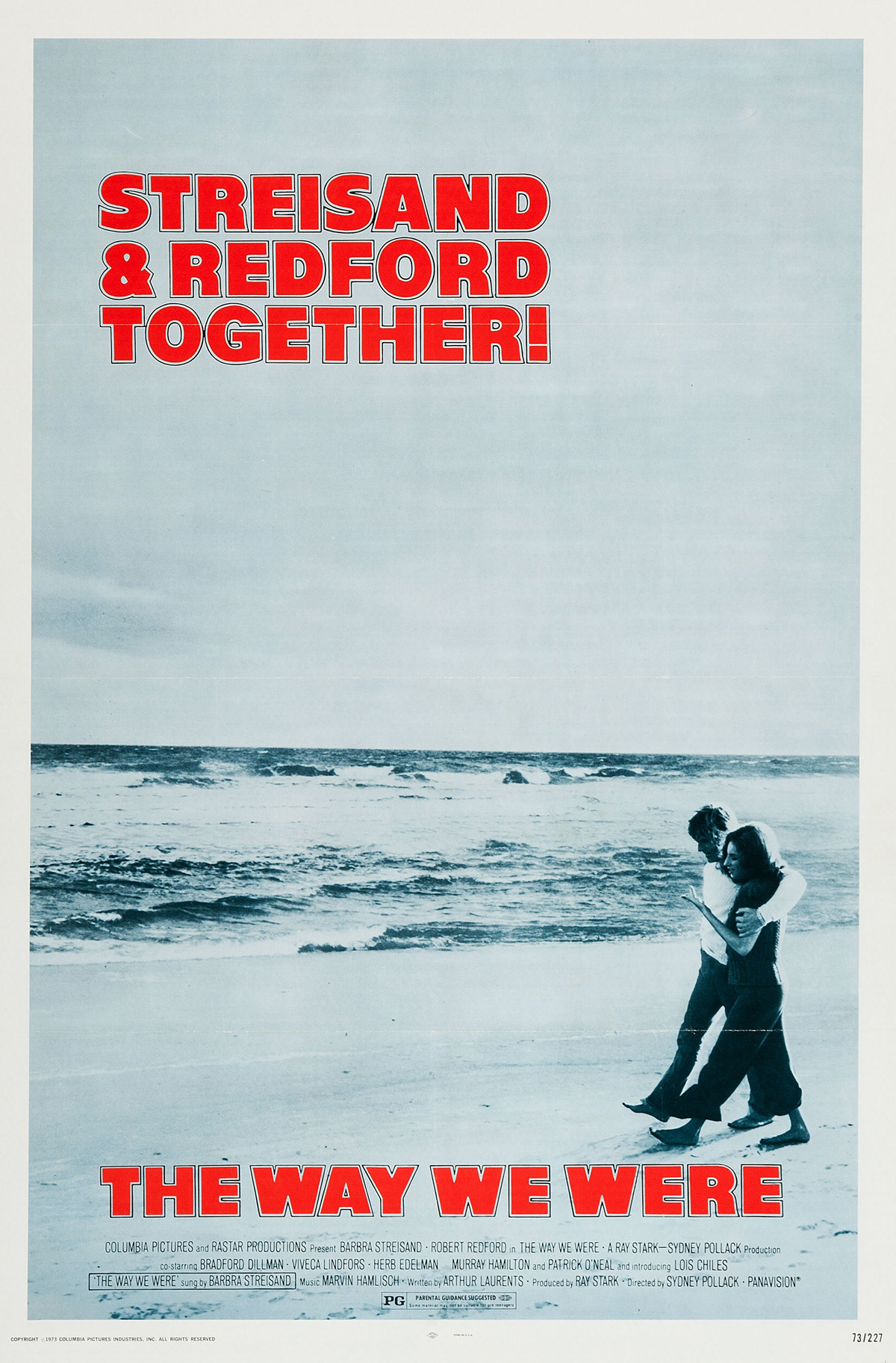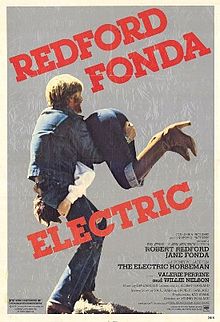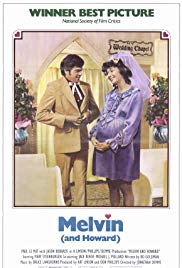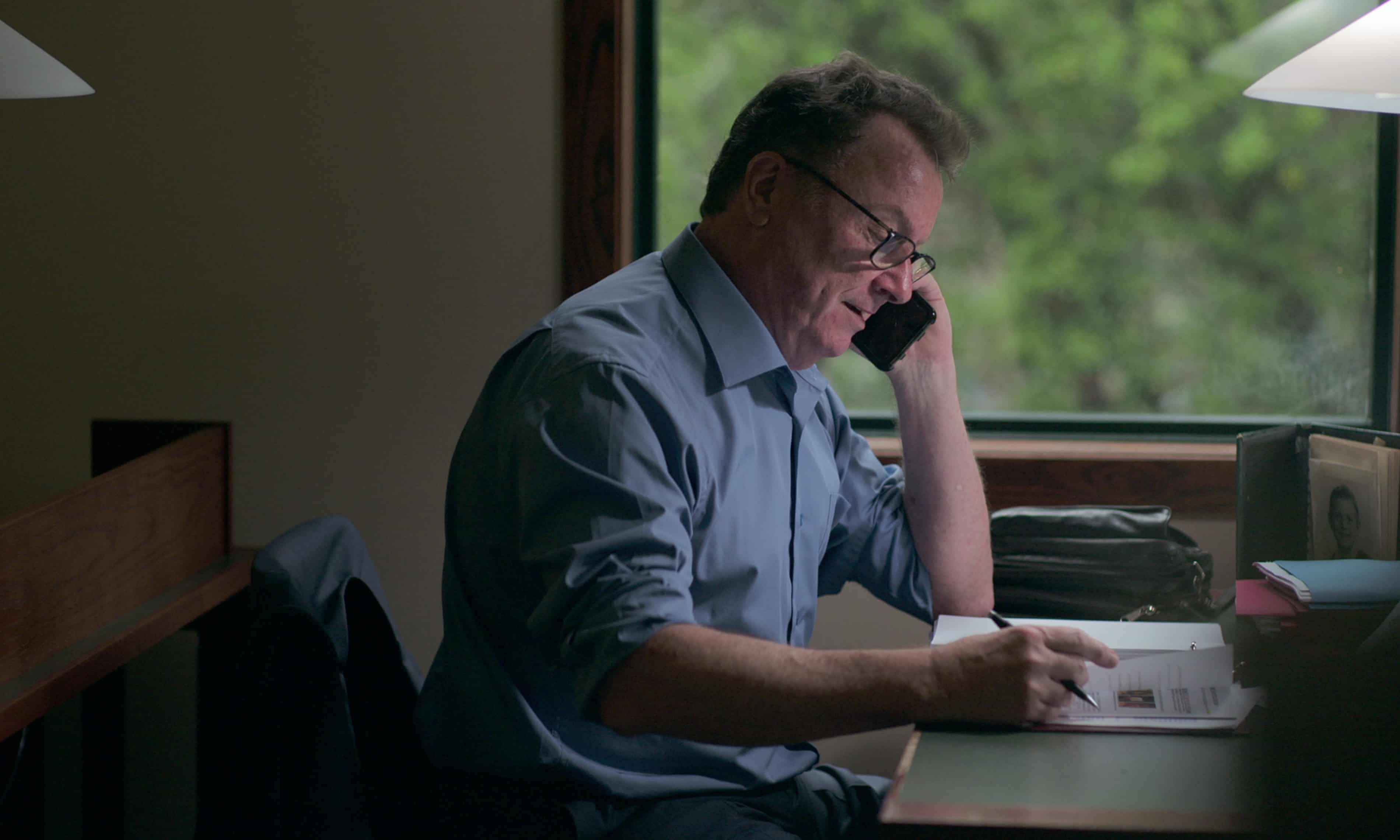So where’d the money go? In ‘The Pursuit of D.B. Cooper,’ the fiction is a lot stranger than the truth
Sometimes, movies take a flying leap. That’s literally and figuratively what happens in “The Pursuit of D.B. Cooper,” which would’ve been an impressively creative Hollywood idea if it wasn’t, like so many other Hollywood productions, simply adapted from a book.
Outlaws can be powerful movie characters. They seem to thrive when times are tough. The targets tend to be banks, corrupt cops and rival gangsters. “Pursuit” nearly adds another much-maligned entity to that list — an airline — but, unlike its protagonist, gets cold feet. It’s not the airline that will pursue Cooper in this film, it’s the dreaded insurance company, which employs sadistic Vietnam platoon leaders prone to operating a little outside the law.
Cooper’s exploits seem like they should be a great movie. The problem with “Pursuit” is that Cooper is as much a mystery to these filmmakers as he is to the general public. Nobody knows who he was or why he did it or what happened to him. He is on the short list of the Most Famous Missing Persons in History that includes Amelia Earhart and Jimmy Hoffa.
That’s the intrigue. There are movies, including recent ones, about all three of those figures. Most of them include at least a preponderance of facts. “Pursuit” has virtually none. It has to invent its own airline (the actual was Northwest Orient) and escape route and, apparently so it can film this antihero in flight, chooses an easier time of day (sunny, late afternoon) for the fateful jump that actually took place in the dark, in the rain, which is most likely why Cooper and nearly all of the money never turned up.
“Pursuit” sort of decides who this person could’ve been and how he might have ... taken part in several car chases. As Variety put it in 1980, Cooper seems to have “landed in an episode of The Dukes of Hazzard.”
The production disaster of “Pursuit” is well-documented. Variety said the film went through three directors; the movie’s Wikipedia page indicates there were actually four. Gene Siskel seemed to think there were only two but decides in his 2½-star review that somewhere in the process, the movie was “supposed to offer a more personal slice of Americana.”
Roger Ebert, who reviewed “Pursuit” on his TV show but apparently not in print, liked to condemn other films for what he called the Idiot Plot: “Everyone in the movie is an idiot or the mystery would be solved in five minutes.” That’s certainly true in “Pursuit.” The mastermind of a very complicated heist has no clue where to hide the money. A flight attendant somehow doesn’t bother to confide her positive ID to the police, so instead of a nationwide manhunt, Robert Duvall’s insurance enforcer Bill Gruen has got the case to himself. (In real life, the insurance company wasn’t on the hook until years later.)
There is a decent angle that the movie didn’t develop. The cash is a hot macguffin. Presumably Cooper had few assets (at least in this movie, that’s true), so the insurance company does find itself with an intriguing problem: Recover the $20 bills, or write the whole thing off. The Cooper character in this movie could do any number of things with the cash. He could, as long as he was free, spend it. He could hide it. He could, if cornered, either return it for leniency or burn it to spite society.
This gives Gruen a considerable challenge and a tight deadline. The longer Cooper is free, the greater the chance the money could disappear. Are audiences going to be moved by an insurance company’s bottom line and Gruen’s sense of urgency? No, but in the category of drama, it’s something. Gruen would have strong motivation to recover the cash. Calling the cops to surround Cooper, rather than going rafting, would seem like the preferred option.
“Pursuit” is from the Little Guy subgenre that includes “Dog Day Afternoon,” a stellar film, and “Fun With Dick and Jane” (done a couple of times) and “Going in Style” and “The Electric Horseman,” in which people with some kind of grievance and yearning for adventure wage war against the establishment without physically harming anyone and, at least momentarily, win. Adapted from the book Free fall: A novel, “Pursuit spent far more time on Cooper’s escape route than his motivation and feebly tries to depict, via Cooper’s wife watching TV in a bar, the same type of public support for Cooper received by Sonny Steele in “Horseman.” The fallback cliché for Cooper’s motivation is a monstrous one of this era, the unhinged Vietnam veteran, although this guy is happy-go-lucky, because this production doesn’t want to get too serious.
Both Roger Ebert (on TV) and Gene Siskel (in print) suggested “Pursuit” having parallels, or aspirations, to “Melvin and Howard,” a 1980 film about a different Western mystery. Both movies curiously heavily invoke country music; “Pursuit” has nice work by Waylon Jennings and Jessi Colter. “Melvin” shows the daily life of the people involved and lets viewers judge how this all might’ve come to be. In that movie there aren’t really victims and there apparently wasn’t a crime, though there may have been wrongdoing.
Cooper did have victims. They weren’t just the insurance company. The passengers did not know what had happened until deplaning, but the flight crew and authorities were aware of Cooper’s threat and the risks of traveling with him for hours. “Pursuit” is sensitive to this reality and gets around it with a couple of lines, one where the flight attendant chirps that Cooper was “a lot cuter” than the other suspect photographs she is shown, and another where Cooper assures his dad that he did “everything you taught: Logistics, timing and covering your ass. Nobody got hurt.” Viewer admiration for this character is now cleared for takeoff.
Duvall is the filmmakers’ big get. His presence gives this production instant credibility. The rest is up to the upstarts, Treat Williams and Kathryn Harrold, who both at this time flirted with the A list and, as “Pursuit” disappointingly confirms, never quite got there. Williams is more famous for his first name than any of his roles. “Melvin and Howard” had a similar headwind, teaming Jason Robards with Paul Le Mat, a curious choice who never really gained momentum from “American Graffiti” many years earlier.
Duvall isn’t the only elite talent in this production. The musical bookends are James Horner and Waylon Jennings, and the extensive outdoor action photography is handled by Harry Stradling Jr. and Charles F. Wheeler, both previous Oscar nominees (Stradling for “The Way We Were”.) Production designer Preston Ames was a veteran, two-time Oscar winner. It all added up to no Oscar nods, not even a Golden Globe, for “Pursuit.”
The way to go here is not the Cooper character outdueling law enforcement, but a lighter version of “The French Connection” or “Zodiac” or even “JFK”: where a determined lawman, not the suspect, is the protagonist, frantically pursuing a bad guy — or a ghost — who’s always one step ahead. Where does this kind of investigation start, what kind of tips are received, what kind of priority does the case get from law enforcement. Most importantly, why (10 years later in the case of the movie; 50 years later today) are people still fascinated, and frustrated, by this case.
Instead of that kind of intellectual Western, “Pursuit,” which for half an hour is highly compelling, devolves into little more than a ridiculous, laughing rural car chase, punctuated by Treat Williams’ obnoxious mugging for the camera. One statement “Pursuit” will make is that the hijacking was done for sport, by someone who found it a great challenge and felt his considerable skills went to waste in the military. This Cooper — his character name in the movie is Jim Meade — doesn’t bear obvious scars from Vietnam and doesn’t seem to know why he did it or what he plans to do with the money. There’s a raft chase, a biplane chase, a factory chase. There’s a third figure from this Vietnam unit who somehow is aware of Cooper’s identity and also wants in on the action, staging interruptions of the plot that would take days. There’s always a junky car with keys lying around just when somebody needs it; there are so many people causing mayhem that the National Guard would be called in.
Cooper interest since November 1971 has been constant. A couple recent TV documentaries about Cooperphiles indicates they’ve expended a lot of energy for nothing, except one of them did win a court battle to get part of the FBI’s case file released. If there was a key moment in the investigation, it was February 1980, when $5,800 in Cooper money was found by an 8-year-old boy along the Columbia River. How it got there has ever since been a matter of wide speculation. Had “Pursuit” premiered shortly after, the movie could’ve gotten a “China Syndrome”-type boost from actual news, but the movie came a year and a half after the money find, too late for a headline pop at the box office.
Most likely, Cooper and his loot ended up in a remote river. “Pursuit” is a curious concept. But the outcome is just a lot of worthless, undeveloped speculation. D.B. Cooper is not unlike another early ’70s mystery, the “Deep Throat” Watergate source for Woodward and Bernstein. That identity was long a parlor game in Washington. Then Mark Felt declared himself Deep Throat in 2005 at age 91, and people stopped caring. Someday there will be a DNA match, or a family revelation, and the world’s hunger for D.B. Cooper drama will be satisfied.
2 stars
(February 2024)
“The Pursuit of D.B. Cooper” (1981)
Starring
Robert Duvall
as Gruen ♦
Treat Williams
as Meade ♦
Kathryn Harrold
as Hannah ♦
Ed Flanders
as Brigadier ♦
Paul Gleason
as Remson ♦
R.G. Armstrong
as Dempsey ♦
Dorothy Fielding
as Denise ♦
Nicolas Coster
as Avery ♦
Cooper Huckabee
as Homer ♦
Howard K. Smith
as Howard K. Smith ♦
Christopher Curry
as Hippie ♦
Ramon Chavez
as El Capitan ♦
Stacy Newton
as Cowboy ♦
Pat Ast
as Horse Lady ♦
Jack Dunlap
as Drinking Buddy ♦
Brad Sergi
as Drinking Buddy ♦
Michael Potter
as Pilot ♦
Charles Benton
as Sharpshooter ♦
Mike Casper
as Bomb Squad ♦
James Lee
as Bomb Squad ♦
Henry Kendrick
as FBI Agent ♦
James Wiers
as FBI Agent ♦
Mark Jeffreys
as FBI Agent ♦
D.G. Smilnak
as FBI Agent ♦
David Adams
as FBI Interviewer ♦
Charles Haigh
as Navigator ♦
Stephen Blood
as Co-Pilot ♦
Tommy Ciulla
as Boy Friend in Stream ♦
Karen Newhouse
as Girl Friend in Stream ♦
Richard Brown
as Crop Duster Man ♦
Michael O’Hare
as Car Owner ♦
Robert Sola
as Ranger ♦
Tom May
as Copter Pilot ♦
Sanford Gibbons
as State Trooper ♦
Lynn Radcliffe
as Cop at Luncheonette ♦
Mearl Ross
as Indian Father ♦
Patrick Garcia
as Indian Boy ♦
Gregory Suke
as Indian Boy ♦
Jessica Garcia
as Indian Girl ♦
Leigh Webb
as Bartender ♦
Jim Clouse
as Saloon Man ♦
David Falkosky
as Saloon Man ♦
John Herold
as Saloon Man ♦
Bill Townsend
as Saloon Player ♦
Christine Dolny
as Child ♦
Michael Goodsite
as Child ♦
Glenda Young
as Avery’s Secretary ♦
Dave Gilbert
as Person-on-the-Street ♦
Bill Wittman
as Person-on-the-Street ♦
Conrad Marshall
as Person-on-the-Street ♦
Marsoupial
as Possum
Directed by: Roger Spottiswoode
Written by: J.D. Reed (book)
Written by: Jeffrey Alan Fiskin (screenplay)
Producer: Michael Taylor
Producer: Daniel Wigutow
Associate producer: Ron Shelton
Executive producer: Donald Kranze
Executive producer: William Tennant
Music: James Horner
Cinematography: Harry Stradling, Charles F. Wheeler
Editing: Allan Jacobs, Robbe Roberts
Casting: Jennifer Jackson Part, Karen Rae
Production design: Preston Ames
Set decoration: Mickey Michaels, Chris Westland
Makeup and hair: Jean Austin, Gail Rowell, Larry Darr, John Elliot, Barbara Guedel
Unit production manager: Hal Klein
Unit production manager — additional photography: Art Levinson
Stunts: Gary Combs, Gilbert Combs, Alan Gibbs, Al Jones, Kathy Massengale, Breck O’Neill, Ruth Redfern, Michael Sammons, Art Scholl, Jerry Meyers
